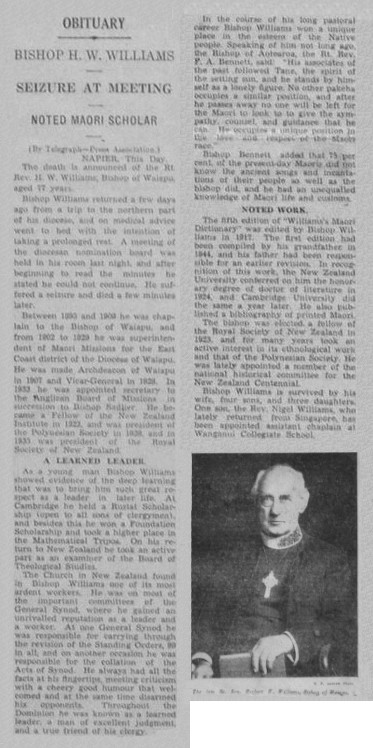OBITUARY
BISHOP H.W. WILLIAMS
SEIZURE AT MEETING
NOTED MAORI SCHOLAR
(By Telegraph – Press Association.)
NAPIER, This Day
The death is announced of the Rt. Rev. H.W. Williams, Bishop of Waiapu, aged 77 years.
Bishop Williams returned a few days ago from a trip to the northern part of his diocese, and on medical advice went to bed with the intention of taking a prolonged rest. A meeting of the diocesan nomination board was held in his room last night, and after beginning to read the minutes he stated he could not continue. He suffered a seizure and died a few minutes later.
Between 1895 and 1909 he was chaplain to the Bishop of Waiapu, and from 1902 to 1929 he was superintendent of Maori Missions for the East Coast district of the Diocese of Waiapu. He was made Archdeacon of Waiapu in 1907 and Vicar-General in 1928. In 1933 he was appointed secretary to the Anglican Board of Missions in succession to Bishop Sadlier. He became a Fellow of the New Zealand Institute in 1923 and was president of the Polynesian Society in 1929, and in 1935 was president of the Royal Society of New Zealand.
A LEARNED LEADER
As a young man Bishop Williams showed evidence of the deep learning that was to bring him such great respect as a leader in later life. At Cambridge he held a Rustat Scholarship (open to all sons of clergymen) and besides this he won a Foundation Scholarship and took a higher place in the Mathematical Tripos. On his return to New Zealand he took an active part as an examiner of the Board of Theological Studies.
The Church in New Zealand found in Bishop Williams one of its most ardent workers. He was on most of the important committees of the General Synod, where he gained an unrivalled reputation as a leader and a worker. At one General Synod he was responsible for carrying through the revision of the Standing Orders, 99 in all, and on another occasion he was responsible for the collation of the Acts of Synod. He always had all the facts at his fingertips, meeting criticism with a cheery good humour that welcomed and at the same time disarmed his opponents. Throughout the Dominion he was known as a learned leader, a man of excellent judgement, and a true friend of his clergy.
In the course of his long pastoral career Bishop Williams won a unique place in the esteem of the Native people. Speaking of him not long ago, the Bishop of Aotearoa, the Rt. Rev. F.A. Bennett, said “His associates of the past followed Tane, the spirit of the setting sun, and he stands by himself as a lonely figure. No other pakeha occupies a similar position, and after he passes away no one will be left for the Maori to look to to give the sympathy, counsel, and guidance that he can. He occupies a unique position in the love and respect of the Maori race.”
Bishop Bennett added that 75 per cent of the present-day Maoris did not know the ancient songs and incantations of their people so well as the bishop did, and he had an unequalled knowledge of Maori life and customs.
NOTED WORK
The fifth edition of “Williams’s Maori Dictionary” was edited by Bishop Williams in 1917. The first edition had been compiled by his grandfather in 1844, and his father had been responsible for an earlier revision. In recognition of this work, the University of New Zealand conferred upon him the honorary degree of doctor of literature in 1924, and Cambridge University did the same a year later. He also published a bibliography of printed Maori.
The bishop was elected a Fellow of the Royal Society of New Zealand in 1923, and for many years took an active interest in its ethnological work and that of the Polynesian Society. He was lately appointed a member of the national historical committee for the New Zealand Centennial.
Bishop Williams is survived by his wife, four sons, and three daughters. One son, the Rev. Nigel Williams, who lately returned from Singapore, has been appointed assistant chaplain at Wanganui Collegiate School.












Do you know something about this record?
Please note we cannot verify the accuracy of any information posted by the community.